The Chief AI Officer Show
The Chief AI Officer Show bridges the gap between enterprise buyers and AI innovators. Through candid conversations with leading Chief AI Officers and startup founders, we unpack the real stories behind AI deployment and sales. Get practical insights from those pioneering AI adoption and building tomorrow’s breakthrough solutions.
Episodes
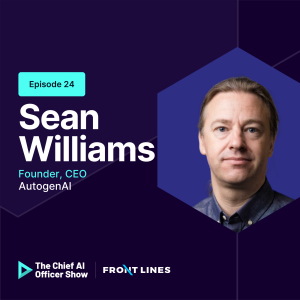
Wednesday Jun 04, 2025
Wednesday Jun 04, 2025
A philosophy student turned proposal writer turned AI entrepreneur, Sean Williams, Founder & CEO of AutogenAI, represents a rare breed in today's AI landscape: someone who combines deep theoretical understanding with pinpointed commercial focus. His approach to building AI solutions draws from Wittgenstein's 80-year-old insights about language games, proving that philosophical rigor can be the ultimate competitive advantage in AI commercialization.
Sean's journey to founding a company that helps customers win millions in government contracts illustrates a crucial principle: the most successful AI applications solve specific, measurable problems rather than chasing the mirage of artificial general intelligence. By focusing exclusively on proposal writing — a domain with objective, binary outcomes — AutogenAI has created a scientific framework for evaluating AI effectiveness that most companies lack.
Topics discussed:
Why Wittgenstein's "language games" theory explains LLM limitations and the fallacy of general language engines across different contexts and domains.
The scientific approach to AI evaluation using binary success metrics, measuring 60 criteria per linguistic transformation against actual contract wins.
How philosophical definitions of truth led to early adoption of retrieval augmented generation and human-in-the-loop systems before they became mainstream.
The "Boris Johnson problem" of AI hallucination and building practical truth frameworks through source attribution rather than correspondence theory.
Advanced linguistic engineering techniques that go beyond basic prompting to incorporate tacit knowledge and contextual reasoning automatically.
Enterprise AI security requirements including FedRAMP compliance for defense customers and the strategic importance of on-premises deployment options.
Go-to-market strategies that balance technical product development with user delight, stakeholder management, and objective value demonstration.
Why the current AI landscape mirrors the Internet boom in 1996, with foundational companies being built in the "primordial soup" of emerging technology.
The difference between AI as search engine replacement versus creative sparring partner, and why factual question-answering represents suboptimal LLM usage.
How domain expertise combined with philosophical rigor creates sustainable competitive advantages against both generic AI solutions and traditional software incumbents.
Listen to more episodes:
Apple
Spotify
YouTube
Intro Quote:
“We came up with a definition of truth, which was something is true if you can show where the source came from. So we came to retrieval augmented generation, we came to sourcing. If you looked at what people like Perplexity are doing, like putting sources in, we come to that and we come to it from a definition of truth. Something's true if you can show where the source comes from. And two is whether a human chooses to believe that source. So that took us then into deep notions of human in the loop.” 26:06-26:36
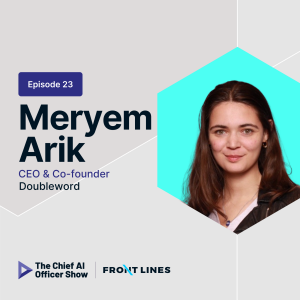
Tuesday May 20, 2025
Tuesday May 20, 2025
From theoretical physics to transforming enterprise AI deployment, Meryem Arik, CEO & Co-founder of Doubleword, shares why most companies are overthinking their AI infrastructure and that adoption can be smoothed over by focusing on deployment flexibility over model sophistication. She also explains why most companies don't need expensive GPUs for LLM deployment and how focusing on business outcomes leads to faster value creation.
The conversation explores everything from navigating regulatory constraints in different regions to building effective go-to-market strategies for AI infrastructure, offering a comprehensive look at both the technical and organizational challenges of enterprise AI adoption.
Topics discussed:
Why many enterprises don't need expensive GPUs like H100s for effective LLM deployment, dispelling common misconceptions about hardware requirements.
How regulatory constraints in different regions create unique challenges for AI adoption.
The transformation of AI buying processes from product-led to consultative sales, reflecting the complexity of enterprise deployment.
Why document processing and knowledge management will create more immediate business value than autonomous agents.
The critical role of change management in AI adoption and why technological capability often outpaces organizational readiness.
The shift from early experimentation to value-focused implementation across different industries and sectors.
How to navigate organizational and regulatory bottlenecks that often pose bigger challenges than technical limitations.
The evolution of AI infrastructure as a product category and its implications for future enterprise buying behavior.
Managing the balance between model performance and deployment flexibility in enterprise environments.
Listen to more episodes:
Apple
Spotify
YouTube
Intro Quote:
“We're going to get to a point — and I don't actually, I think it will take longer than we think, so maybe, three to five years — where people will know that this is a product category that they need and it will look a lot more like, “I'm buying a CRM,” as opposed to, “I'm trying to unlock entirely new functionalities for my organization,” as it is at the moment. So that's the way that I think it'll evolve. I actually kind of hope it evolves in that way. I think it'd be good for the industry as a whole for there to be better understanding of what the various categories are and what problems people are actually solving.” 31:02-31:39
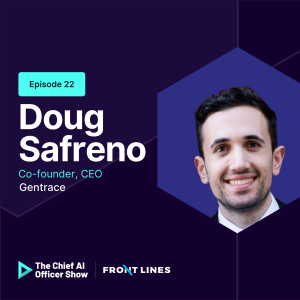
Tuesday May 06, 2025
Tuesday May 06, 2025
The reliability gap between AI models and production-ready applications is where countless enterprise initiatives die in POC purgatory. In this episode of Chief AI Officer, Doug Safreno, Co-founder & CEO of Gentrace, offers the testing infrastructure that helped customers escape the Whac-A-Mole cycle plaguing AI development. Having experienced this firsthand when building an email assistant with GPT-3 in late 2022, Doug explains why traditional evaluation methods fail with generative AI, where outputs can be wrong in countless ways beyond simple classification errors.
With Gentrace positioned as a "collaborative LLM testing environment" rather than just a visualization layer, Doug shares how they've transformed companies from isolated engineering testing to cross-functional evaluation that increased velocity 40x and enabled successful production launches. His insights from running monthly dinners with bleeding-edge AI engineers reveal how the industry conversation has evolved from basic product questions to sophisticated technical challenges with retrieval and agentic workflows.
Topics discussed:
Why asking LLMs to grade their own outputs creates circular testing failures, and how giving evaluator models access to reference data or expected outcomes the generating model never saw leads to meaningful quality assessment.
How Gentrace's platform enables subject matter experts, product managers, and educators to contribute to evaluation without coding, increasing test velocity by 40x.
Why aiming for 100% accuracy is often a red flag, and how to determine the right threshold based on recoverability of errors, stakes of the application, and business model considerations.
Testing strategies for multi-step processes where the final output might be an edit to a document rather than text, requiring inspection of entire traces and intermediate decision points.
How engineering discussions have shifted from basic form factor questions (chatbot vs. autocomplete) to specific technical challenges in implementing retrieval with LLMs and agentic workflows.
How converting user feedback on problematic outputs into automated test criteria creates continuous improvement loops without requiring engineering resources.
Using monthly dinners with 10-20 bleeding-edge AI engineers and broader events with 100+ attendees to create learning communities that generate leads while solving real problems.
Why 2024 was about getting basic evaluation in place, while 2025 will expose the limitations of simplistic frameworks that don't use "unfair advantages" or collaborative approaches.
How to frame AI reliability differently from traditional software while still providing governance, transparency, and trust across organizations.
Signs a company is ready for advanced evaluation infrastructure: when playing Whac-A-Mole with fixes, when product managers easily break AI systems despite engineering evals, and when lack of organizational trust is blocking deployment.
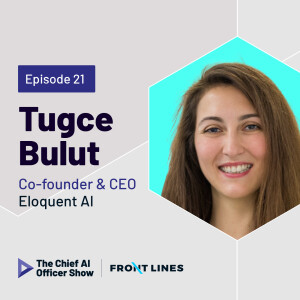
Thursday Apr 10, 2025
Thursday Apr 10, 2025
When traditional chatbots fail to answer basic questions, frustration turns to entertainment — a problem Tugce Bulut, Co-founder & CEO witnessed firsthand before founding Eloquent AI. In this episode of Chief AI Officer, she deconstructs how her team is solving the stochastic challenges of enterprise LLM deployments through a novel probabilistic architecture that achieves what traditional systems cannot. Moving beyond simple RAG implementations, she also walks through their approach to achieving deterministic outcomes in regulated environments while maintaining the benefits of generative AI's flexibility.
The conversation explores the technical infrastructure enabling real-time parallel agent orchestration with up to 11 specialized agents working in conjunction, their innovative system for teaching AI agents to say "I don't know" when confidence thresholds aren't met, and their unique approach to knowledge transformation that converts human-optimized content into agent-optimized knowledge structures.
Topics discussed:
The technical architecture behind orchestrating deterministic outcomes from stochastic LLM systems, including how their parallel verification system maintains sub-2 second response times while running up to 11 specialized agents through sophisticated token optimization.
Implementation details of their domain-specific model "Oratio," including how they achieved 4x cost reduction by embedding enterprise-specific reasoning patterns directly in the model rather than relying on prompt engineering.
Technical approach to the cold-start problem in enterprise deployments, demonstrating progression from 60% to 95% resolution rates through automated knowledge graph enrichment and continuous learning without customer data usage.
Novel implementation of success-based pricing ($0.70 vs $4+ per resolution) through sophisticated real-time validation layers that maintain deterministic accuracy while allowing for generative responses.
Architecture of their proprietary agent "Clara" that automatically transforms human-optimized content into agent-optimized knowledge structures, including handling of unstructured data from multiple sources.
Development of simulation-based testing frameworks that revealed fundamental limitations in traditional chatbot architectures (15-20% resolution rates), leading to new evaluation standards for enterprise deployments.
Technical strategy for maintaining compliance in regulated industries through built-in verification protocols and audit trails while enabling continuous model improvement.
Implementation of context-aware interfaces that maintain deterministic outcomes while allowing for natural language interaction, demonstrated through their work with financial services clients.
System architecture enabling complex sales processes without technical integration, including real-time product knowledge graph generation and compliance verification for regulated products.
Engineering approach to FAQ transformation, detailing how they restructure content for optimal agent consumption while maintaining human readability.
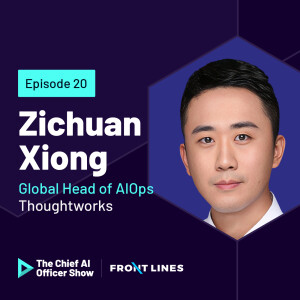
Tuesday Mar 18, 2025
Tuesday Mar 18, 2025
What if everything you've been told about enterprise AI strategy is slowing you down? In this episode of the Chief AI Officer podcast, Zichuan Xiong, Global Head of AIOps at Thoughtworks, challenges conventional wisdom with his "shotgun approach" to AI implementation. After witnessing and navigating nearly two decades of multiple technology waves, Zichuan now leads the AI transformation of Thoughtworks' managed services division. His mandate: use AI to continuously increase margins by doing more with less.
Rather than spending months on strategy development, Zichuan's team rapidly deploys targeted AI solutions across 30+ use cases, leveraging ecosystem partners to drive measurable savings while managing the dynamic gap between POC and production. His candid reflection on consultants often profit from prolonged strategy phases while internally practicing a radically different approach offers a glimpse behind the curtain of enterprise transformation.
Topics discussed:
The evolution of pre-L1 ticket triage using LLMs and how Thoughtworks implemented an AI system that effectively eliminated the need for L1 support teams by automatically triaging and categorizing tickets, significantly improving margins while delivering client cost savings.
The misallocation of enterprise resources on chatbots, which is a critical blind spot where companies build multiple knowledge retrieval chatbots instead of investing in foundational infrastructure capabilities that should be treated as commodity services.
How Deep Seek and similar open source models are forcing commercial vendors to specialize in domain-specific applications, with a predicted window of just 6 months for wrapper companies to adapt or fail.
Why, rather than spending 12 months on AI strategy, Zichuan advocates for quickly building and deploying small-scale AI applications across the value chain, then connecting them to demonstrate tangible value.
AGI as a spectrum rather than an end-state and how companies must develop fluid frameworks to manage the dynamic gap between POCs and production-ready AI as capabilities continuously evolve.
The four critical gaps organizations must systematically address: data pipelines, evaluation frameworks, compliance processes, and specialized talent.
Making humans more human through AI and how AI's purpose isn't just productivity but also enabling life-improving changes such as a four-day workweek where technology helps us spend more time with family and community.
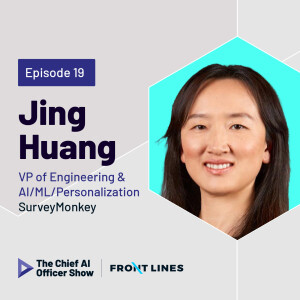
Tuesday Feb 18, 2025
Tuesday Feb 18, 2025
As enterprises race to integrate generative AI, SurveyMonkey is taking a uniquely methodical approach: applying 20 years of survey methodology to enhance LLM capabilities beyond generic implementations. In this episode, Jing Huang, VP of Engineering & AI/ML/Personalization at SurveyMonkey, breaks down how her team evaluates AI opportunities through the lens of domain expertise, sharing a framework for distinguishing between market hype and genuine transformation potential.
Drawing from her experience witnessing the rise of deep learning since AlexNet's breakthrough in 2012, Jing provides a strategic framework for evaluating AI initiatives and emphasizes the critical role of human participation in shaping AI's evolution. The conversation offers unique insights into how enterprise leaders can thoughtfully approach AI adoption while maintaining competitive advantage through domain expertise.
Topics discussed:
How SurveyMonkey evaluated generative AI opportunities, choosing to focus on survey generation over content creation by applying their domain expertise to enhance LLM capabilities beyond what generic models could provide.
The distinction between internal and product-focused AI implementations in enterprise, with internal operations benefiting from plug-and-play solutions while product integration requires deeper infrastructure investment.
A strategic framework for modernizing technical infrastructure before AI adoption, including specific prerequisites for scalable data systems, MLOps capabilities, and real-time processing requirements.
The transformation of survey creation from a months-long process to minutes through AI, while maintaining methodological rigor by embedding 20+ years of survey expertise into the generation process.
The critical importance of quality human input data over quantity in AI development, with insights on why synthetic data and machine-generated content may not be the solution to current data limitations.
How to evaluate new AI technologies through the lens of domain fit and implementation readiness rather than market hype, illustrated through SurveyMonkey's systematic assessment process.
The role of human participation in shaping AI evolution, with specific recommendations for how organizations can contribute meaningful data to improve AI systems rather than just consuming them.
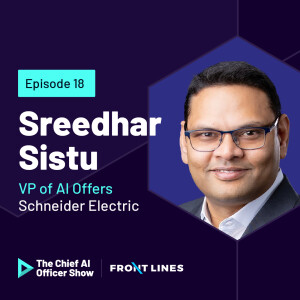
Thursday Feb 06, 2025
Thursday Feb 06, 2025
From optimizing microgrids to managing peak energy loads, Sreedhar Sistu, VP of AI Offers, shares how Schneider Electric is harnessing AI to tackle critical energy challenges at global scale. Drawing from his experience deploying AI across a 150,000-person organization, he shares invaluable insights on building internal platforms, implementing stage-gate processes that prevent "POC purgatory," and creating frameworks for responsible innovation.
The conversation spans practical deployment strategies, World Economic Forum governance initiatives, and why mastering fundamentals matters more than chasing technology headlines. Through concrete examples and honest discussion of challenges, Sreedhar demonstrates how enterprises can move beyond pilots to create lasting value with AI.
Topics discussed:
Transforming energy management through AI-powered solutions that optimize microgrids, manage peak loads, and orchestrate renewable energy sources effectively.
Building robust internal platforms and processes to scale AI deployment across a 150,000-person global organization.
Creating stage-gate evaluation processes that prevent "POC purgatory" by focusing on clear business outcomes and value creation.
Balancing in-house AI development for core products with strategic vendor partnerships for operational efficiency improvements.
Managing uncertainty in AI systems through education, process design, and clear communication about probabilistic outcomes.
Developing frameworks for responsible AI governance through collaboration with the World Economic Forum and regulatory bodies.
Tackling climate challenges through AI applications that reduce energy footprint, optimize energy mix, and enable technology adoption.
Implementing people-centric processes that combine technical expertise with business domain knowledge for successful AI deployment.
Navigating the evolving regulatory landscape while maintaining focus on innovation and value creation across global markets.
Building internal capabilities to master AI technology rather than relying solely on vendor solutions and external expertise.
Listen to more episodes:
Apple
Spotify
YouTube
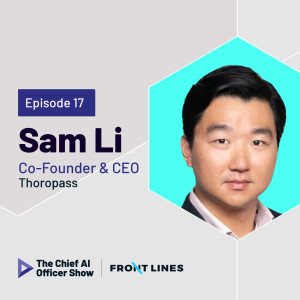
Wednesday Jan 22, 2025
Wednesday Jan 22, 2025
Thoropass Co-founder and CEO Sam Li joins Ben on Chief AI Officer to break down how AI is shaping the compliance and security landscape from two crucial angles: as a powerful tool for automation and as a source of new challenges requiring innovative solutions.
Sam shares how their First Pass AI feature is helping along the audit process by providing instant feedback, and also explores why back-office operations are the hidden frontier for AI transformation. The conversation explores everything from navigating state-level AI regulations to building effective testing frameworks for LLM-powered systems, offering a comprehensive look at how enterprises can maintain security while driving innovation in the AI era.
Topics discussed:
The evolution of AI capabilities in compliance and security, from basic OCR technology to today's sophisticated LLM applications in audit automation.
How companies are managing novel AI risks including hallucination, bias, and data privacy concerns in regulated environments.
The transformation of back-office operations through AI agents, with predictions of 90% automation in traditional compliance work.
Development of new testing frameworks for LLM-powered systems that go beyond traditional software testing approaches.
Go-to-market strategies in the enterprise space, specifically shifting from direct sales to partner-driven approaches.
The impact of AI integration on enterprise sales cycles and the importance of proactive stakeholder engagement.
Emerging AI compliance standards, including ISO 42001 and HITRUST certification, preparing for increased regulatory scrutiny.
Framework for evaluating POC success: distinguishing between use case fit, foundation model limitations, and implementation issues.
The false dichotomy between compliance and innovation, and how companies can achieve both through strategic AI deployment.
Listen to more episodes:
Apple
Spotify
YouTube
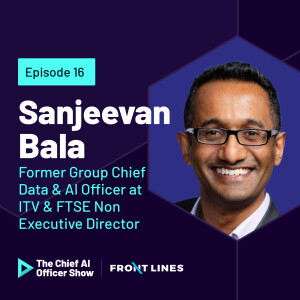
Wednesday Jan 08, 2025
Wednesday Jan 08, 2025
Sanjeevan Bala, Former Group Chief Data & AI Officer at ITV and FTSE Non Executive Director's media value chain to content production and monetization. He reveals why starting with "last mile" business value led to better outcomes than following industry hype around creative AI.
Sanjeevan also provides a practical framework for moving from experimentation to enterprise-wide adoption. His conversation with Ben covers everything from increasing ad yields through AI-powered contextual targeting to building decentralized data teams that "go native" in business units.
Topics discussed:
How AI has evolved from basic machine learning to today's generative capabilities, and why media companies should look beyond the creative AI hype to find real value.
Breaking down how AI impacts each stage of media value chains: from reducing production costs and optimizing marketing spend to increasing viewer engagement and maximizing ad revenue.
Why starting with "last mile" business value and proof-of-value experiments leads to better outcomes than traditional POCs, helping organizations avoid the trap of "POC purgatory."
Creating successful AI teams by deploying them directly into business units, focusing on business literacy over technical skills, and ensuring they go native within departments.
Developing AI systems that analyze content, subtitles, and audio to identify optimal ad placement moments, leading to premium advertising products with superior brand recall metrics.
Understanding how agentic AI will transform media operations by automating complex business processes while maintaining the flexibility that rule-based automation couldn't achieve.
How boards oscillate between value destruction fears and growth opportunities, and why successful AI governance requires balancing risk management with innovation potential.
Evaluating build vs buy decisions based on core competencies, considering whether to partner with PE-backed startups or wait for big tech acquisition cycles.
Challenging the narrative around AI productivity gains, exploring why enterprise OPEX costs often increase despite efficiency improvements as teams move to higher-value work.
Connecting AI ethics frameworks to company purpose and values, moving beyond theoretical principles to create practical, behavioral guidelines for responsible AI deployment.
Episode 16.
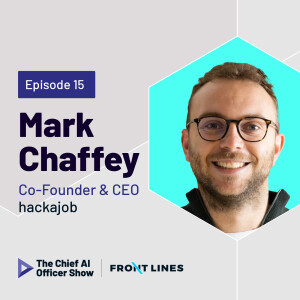
Tuesday Dec 17, 2024
Tuesday Dec 17, 2024
Mark Chaffey, Co-founder & CEO at hackajob talks about the impact of AI on the recruitment landscape, sharing insights into how leveraging LLMs can enhance talent matching by focusing on skills rather than traditional credentials.
He emphasizes the importance of maintaining a human touch in the hiring process, ensuring a positive candidate experience amidst increasing automation, while still leveraging those tools to create a more efficient and inclusive hiring experience. Additionally, Mark discusses the challenges posed by varying regulations across regions, highlighting the need for adaptability in the evolving recruitment space.
Topics discussed:
The evolution of recruitment technology and how AI is reshaping the hiring landscape.
How skills-based assessments, rather than conventional credentials, allow companies to identify talent that may not fit traditional hiring molds.
Leveraging LLMs to enhance talent matching, enabling systems to understand context and reason beyond simple keyword searches.
The significance of maintaining a human touch in recruitment processes, ensuring candidates have a positive experience despite increasing automation in hiring.
Addressing the challenge of bias in AI-driven recruitment, emphasizing the need for transparency and fairness in automated decision-making systems.
The impact of varying regulations across regions on AI deployment in recruitment, highlighting the need for companies to adapt their strategies accordingly.
The role of internal experimentation and a culture of innovation in developing new recruitment technologies and solutions that meet evolving market needs.
Insights into the importance of building a strong data asset for training AI systems, which can significantly enhance the effectiveness of recruitment tools.
The balance between iterative improvements on core products and pursuing big bets in technology development to stay competitive in a rapidly changing market.
The potential for agentic AI systems to handle initial candidate interactions, streamlining the hiring process further.
(Episode 15)


